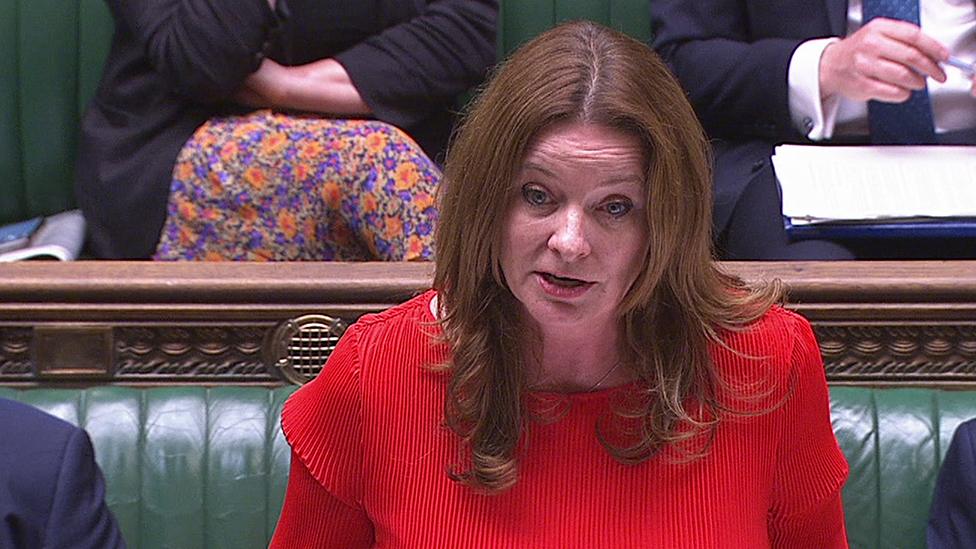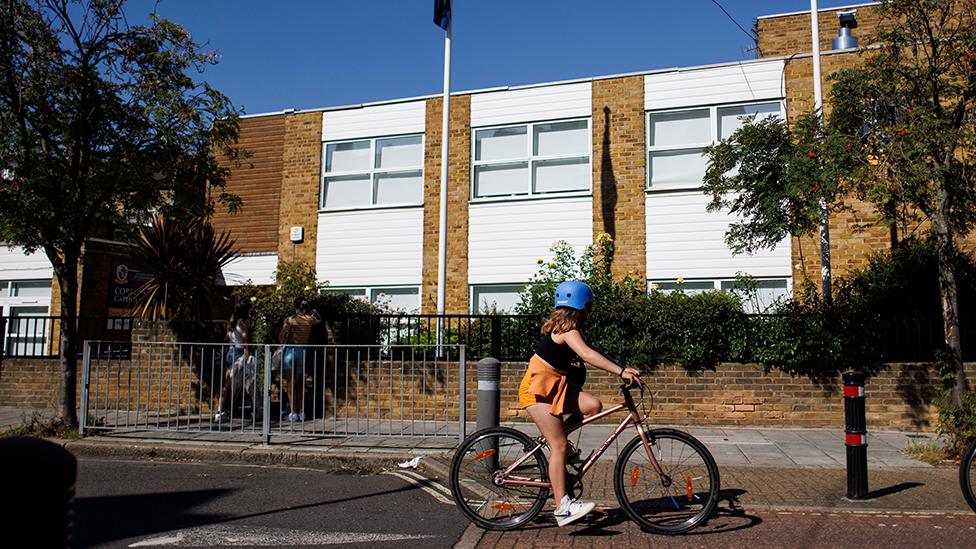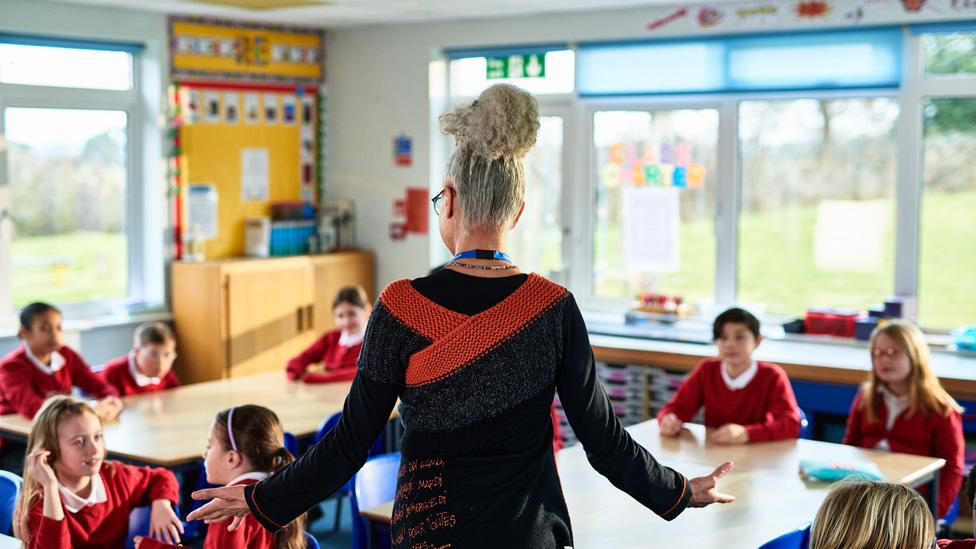School concrete: Don't blame me to failing to fix RAAC - Rishi Sunak
- Published
The PM says the government acted as "swiftly as possible" when concrete issues were found in schools across England.
Rishi Sunak has said it was "utterly wrong" to suggest he oversaw budget cuts that led to crumbling concrete in schools in England not being repaired.
A former senior civil servant accused Mr Sunak of ignoring recommendations up to 400 schools needed rebuilding annually while he was chancellor.
Jonathan Slater said funding for repairs was cut to cover just 50 sites.
Dozens of schools in England have been fully or partially shut as they contain crumbling concrete.
Education Secretary Gillian Keegan told the House of Commons she will publish a list of affected schools later this week.
Earlier, Ms Keegan admitted hundreds of schools could contain reinforced autoclaved aerated concrete (RAAC) creating further uncertainty at the start of the school year.
Outlining figures, the education secretary said around 50 schools have already undergone mitigation work - and at least another 104 schools are confirmed to contain the material.
Around 10% of the 15,000 schools built during the period RAAC concrete was used have not yet responded to a government survey on the material, she added.
Mr Sunak said the government expected 95% of the 22,000 schools in England would not be impacted by the issues.
Meanwhile in Scotland, 35 council-run schools have been found to contain RAAC, but they are remaining open with First Minister Humza Yousaf saying there were no immediate safety concerns. Schools returned form the summer break ahead of the rest of the UK, with pupils back last month. Mr Yousaf said a review will take "some months" to complete.
The material has also been found found in at least 24 university and college buildings in Scotland.
In Wales, two schools have closed because of concerns over RAAC.
Mr Slater - who was permanent secretary at the Department for Education (DfE) between May 2016 and August 2020 - said investigations had led civil servants to recommend between 300 to 400 schools needed repairs each year and the department then requested Treasury funding to cover 200 a year.
"I thought we'd get it but the actual decision made in 2021 was to halve down from 100 a year to 50 year," he told BBC Radio 4's Today programme.
Former top civil servant Jonathan Slater explains his frustration at trying to replace schools with RAAC.
However, in response Mr Sunak said it was "completely and utterly wrong" to blame him and he had announced a programme to rebuild 500 schools over 10 years in his first spending review in 2020, equating to 50 schools a year.
"If you look at what we have been doing over the previous decade, that's completely in line with what we have always done," he said.

Schools concrete crisis

Labour leader Keir Starmer said the concrete crisis was "descending into farce"
"The government has dropped the ball here, failed to prepare. The prime minister bears responsibility for some of the key decisions along the way.
"And instead of coming out today and saying, 'This is what we're going to do to fix the problem, which we have made a lot worse', you've got members of the Cabinet coming out trying to blame other people, trying to blame people within their own teams and to say, essentially, 'Put responsibility anywhere but on the government'."
Some in government are worrying that voters tune out the specific questions about how the RAAC problem developed and instead see it as symptomatic of a government running out of steam.

'I think it's so irresponsible'
The DfE announcement that 104 schools and colleges in England must partially or fully close buildings came days before pupils were due to return to classrooms. Parents and teachers have told the BBC how it has made them feel:
"We don't want our children in unsafe buildings, and it's quite clear they've been in unsafe buildings all this time, and that should never have happened." Hina Robinson, whose daughter goes to Wyburns Primary School in Essex
"In a way we're really lucky because we know that there's an issue and that it's going to be resolved, and that they are in school this morning trying to work out exactly where the children will be educated. And I feel sorry for those parents sat there thinking, 'has our school been surveyed?'" Duncan Campbell, whose sons go to White Hall Academy in Clacton-on-Sea, Essex
"The way they've left it right till the end of the summer holidays when children and young people are going back to school this week and next, I think it's so irresponsible." Teaching assistant Necuti on 5 Live
"This is a crisis for schools. We need the reassurance that this is going to be all hands to the pump." Peter Smith, head teacher of Farlingaye High School in Woodbridge, Suffolk, where a third of classrooms as well as toilets changing rooms and office spaces had RAAC concrete identified
"Ten classrooms out is very different to 20 classrooms out, so I need to let parents know today…I needed someone to tell me where I'm at really." Sarah Skinner, chief executive of the Penrose Trust which oversees eight schools - three of which have RAAC

Elsewhere on Monday, Ms Keegan apologised after being caught swearing on mic as she expressed frustration at a lack of gratitude for the handling of the school building crisis in England.
She made the comments just after finishing an interview with ITV news while the camera was still filming.
A No 10 source told the BBC those comments by Ms Keegan were "wrong", but in a follow-up interview Ms Keegan apologised for her "choice language".
Keegan: 'Does anyone ever say, you've done a good job?'
Earlier, in a separate round of interviews Ms Keegan defended the government's spending on infrastructure.
She said £15bn had gone into capital spending since 2015 - but added it was about "delivering value for money".
Ms Keegan explained a full list of schools affected would be published later this week and she was "hoping" it would not be the case pupils turn up at the school gates only to find buildings closed.
She added around 1% of schools which had responded to the survey had been found to contain the material.
Temporary mitigation measures in schools will be funded by the DfE, but other things like transport of students to new locations will be considered on a case-by-case basis, she said.

Is your child's school affected? Get in touch by emailing haveyoursay@bbc.co.uk, external.
Please include a contact number if you are willing to speak to a BBC journalist. You can also get in touch in the following ways:
WhatsApp: +44 7756 165803
Tweet: @BBC_HaveYourSay, external
Please read our terms & conditions and privacy policy
If you are reading this page and can't see the form you will need to visit the mobile version of the BBC website to submit your question or comment or you can email us at HaveYourSay@bbc.co.uk, external. Please include your name, age and location with any submission.

Related topics
- Published4 September 2023

- Published13 February 2024

- Published19 September 2023
